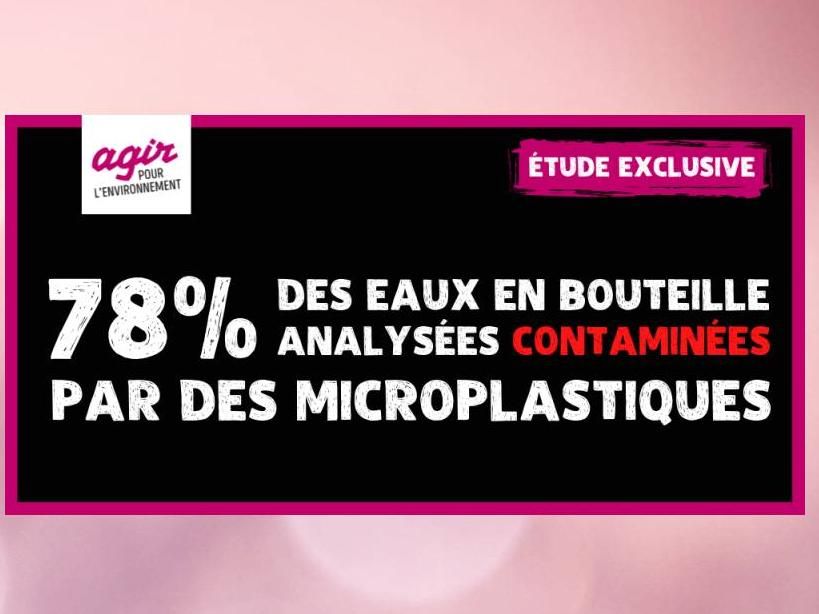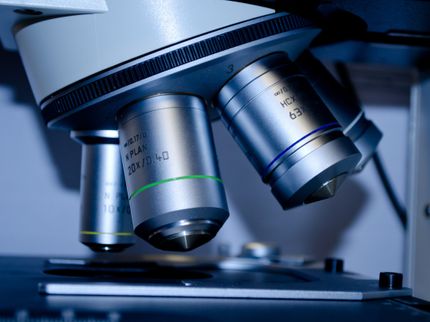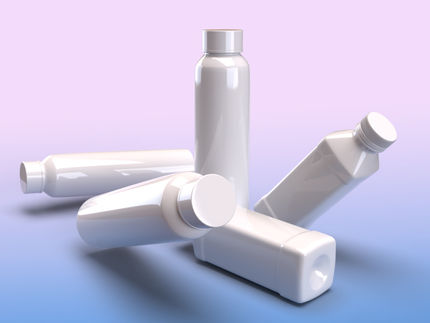Microplastics: 78% of bottled water analyzed contaminated
Agir pour l'Environnement has published today an analysis report studying the presence of microplastics in the most sold bottled waters in France: Badoit, Carrefour, Cristaline, Evian (50 cl and 1 liter), Perrier, Vittel (33 cl and 1 liter), Volvic.

Association Agir pour l'Environnement
Out of nine waters analyzed, seven contain microplastics
Within the framework of this study, Agir pour l'Environnement commissioned the Labocéa laboratory, specialized in this type of analysis. Applying a particularly careful protocol, Labocéa identified between 1 and 121 plastic microparticles per liter. In total, the laboratory identified four different types of plastics. In view of their nature, it seems that most of these microplastics come from the bottle, the cork and the bottling process. When subjected to high heat and light, these water bottles could release even greater quantities of microplastics.
Water intended for children is the most contaminated!
Vittel Kids holds the sad record of the number of microplastics in these analyses with 40 particles for the 33 cl bottle (thus 121 particles per liter). With an average of 131 liters of bottled water consumed per year, a child is likely to ingest, for this simple use, nearly 16,000 microparticles of plastic each year.
Every week, we ingest the equivalent of a plastic credit card
These results are a new illustration of the omnipresence of plastic in our lives, even in bottled water! Plastic is not an inert and biodegradable material: it tends to fragment into micro-debris and thus contaminates our bodies and our environment. On average, we ingest 5 grams of plastic per week, equivalent to the weight of a credit card, through the water we drink and foods such as seafood, salt, beer...
These results also confirm the conclusions of several scientific studies on the subject and a report of the World Health Organization which already recognized in 2019 the importance of water contamination by microplastics.
For Agir pour l'Environnement: "It is unacceptable to let the bottled water industry sell water polluted with microplastics, but presented as supposedly "pure" and moreover 300 more expensive than tap water! The State must protect our health and the environment, in priority that of the children, by making sure that the food chain is not polluted with microplastics. We must get out of disposable plastic as soon as possible, starting with the banning of plastic bottles.
Responsible for a mountain of waste, plastic bottles can be easily replaced by the many alternatives already available: tap water, water bottles, water fountains, returnable glass, to get out of the logic of all disposable by a virtuous circular economy facing environmental challenges.
Note: This article has been translated using a computer system without human intervention. LUMITOS offers these automatic translations to present a wider range of current news. Since this article has been translated with automatic translation, it is possible that it contains errors in vocabulary, syntax or grammar. The original article in French can be found here.
Most read news
Organizations
Other news from the department business & finance

Get the food & beverage industry in your inbox
By submitting this form you agree that LUMITOS AG will send you the newsletter(s) selected above by email. Your data will not be passed on to third parties. Your data will be stored and processed in accordance with our data protection regulations. LUMITOS may contact you by email for the purpose of advertising or market and opinion surveys. You can revoke your consent at any time without giving reasons to LUMITOS AG, Ernst-Augustin-Str. 2, 12489 Berlin, Germany or by e-mail at revoke@lumitos.com with effect for the future. In addition, each email contains a link to unsubscribe from the corresponding newsletter.



























































